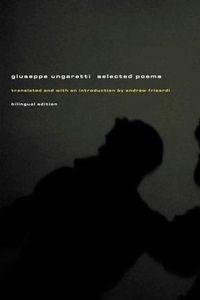Includes index.
GUISEPPE UNGARETTI (1888-1970) is one of Europe's greatest modernist poets. He was also a writer, literary critic, journalist and university professor in Italy and in Brazil. He was born and raised in Alexandria, Egypt, to an Italian family from Tuscany. At the age of 24, he moved to Paris, where he associated with prominent artists of the European avant garde. Ungaretti fought on the Italian front from 1915 to 1917, taking part in some of the bloodiest episodes of the Great War, during which time much of his greatest poetry was written. Ungaretti later worked as a correspondent for Il Popolo d'Italia, a political daily paper founded by Benito Mussolini. In 1936, he moved to Brazil, where he took up a teaching post at Sao Paulo University. He continued to teach, travel and write throughout his life.
A major new translation of one of Italy's greatest modern poets
Giuseppe Ungaretti (1888-1970) was a pioneer of the Modernist movement in Italian poetry and is widely regarded as one of the leading Italian poets of the twentieth century. His verse is renowned and loved for its powerful insight and emotion, and its exquisite music. Yet, unlike many of his peers, Ungaretti has never been adequately presented to English readers. This large bilingual selection, translated with great sensitivity and fidelity by Andrew Frisardi, captures Ungaretti in all of his phases: from his early poems, written in the trenches of northern Italy during World War I, to the finely crafted erotic and religious poetry of his second period, to the visceral, elegiac poetry of the years following the death of his son and the occupation of Rome during World War II, to the love poems of the poet's old age.
Frisardi's in-depth introduction details the world in which Ungaretti's work took shape and exerted its influence. In addition to the poet's own annotations, an autobiographical afterword, "Ungaretti on Ungaretti," further illuminates the poet's life and art. Here is a compelling, rewarding, and comprehensive version of the work of one of the greatest modern European poets.
